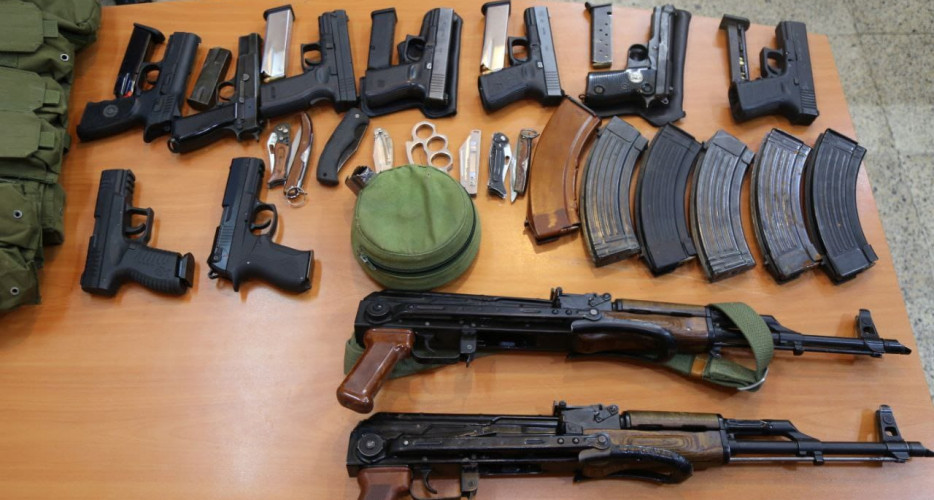
PEREGRAF
He pulled the trigger of an AK-47 on the morning of Eid al-Fitr and killed four people, including a child.
The perpetrator was an officer in the security forces. After his wife left him, he used his service weapon to murder members of his father-in-law’s family.
That gruesome incident in Chamchamal on May 2, 2022 is an example of the troubling trend of domestic violence enabled by the easy availability of guns in the Kurdistan Region.
"Ten-year-old Musa opened the door and got killed first," Mariwan Ahmed, the son of one of the victims, told Peregraf.
"Then the murderer reached the kitchen table and shot [40-year-old] Chro and [44-year-old] Chnur, who was pregnant. He then killed [25-year-old] Choman," Ahmed added.
"He shot my mother when she was in bed because of illness, then he went to my brother’s house, where he wounded my nephew. This was because of domestic problems and because the shooter’s wife kicked him out. She has five children."
That night, members of the Sulaymaniyah Asayish – Western District arrested the man that night.
Ahmed alleged the perpetrator had killed three other people in the past, but was able to continue in the security forces and had even been promoted.
Gender-based violence is rampant in the Kurdistan Region, according to the government and activists. In many instances, the perpetrator uses a firearm, which increases the likelihood of death and injury.
"One of the leading reasons for shootings is the easy access to weapons. Another is the presence of a large number of official government workers who take their weapons home with them when they leave their workplace," lawyer Sami Sati told Peregraf.
The Kurdistan Region’s Weapons Law, which was passed by the Kurdistan National Assembly in 1993, says that people are allowed to carry weapons from the "beginning of youth," but imposes a possible life sentence for violations. As a result of the vagueness of the law, it is not easy to enforce.
In 2015, the Kurdistan Regional Government (KRG) Ministry of Interior sought to address this by reforming the permitting system. Under that regulation, governors and administrative supervisors can approve permits for shotguns and handguns, but assault rifles require permission from the minister themselves.
According to KRG statistics, more than 20,700 permits for carrying weapons have been issued since the Kurdish uprising in 1991.
"One of the problems with the regulation is that armed people are not arrested until they commit some other crime. People who have weapons are not arrested even at checkpoints, in public places, and or their homes," Sati said.
"Even if a picture is published on Facebook with a weapon, the public prosecutor can file a complaint against the person and the police can search their house with a judge’s order," he added.
During a dispute Erbil governorate’s Khabat district on May 14, five people were shot and killed, including a father and his three sons.
The same day, the security forces in Chamcamal district arrested a man after another person was killed by a stray bullet fired during an argument between two families.
Sarkaman Ahmed, a spokesperson for the Sulaimaniyah Police, told Peregraf that "past incidents were all ‘social’ problems’ and most of the shooters have been arrested. It’s rare if the shooter is not arrested."
"If the accused has a military rank, a request will be made to the special ministry in an official letter and the accused will be handed over to the police," he said.
When suspects flee to other governorates, the police spokesperson said that the extradition process is ordinarily routine, but if "there is a military rank, it takes a lot of time through the ministry because the high-ranking people need the approval of the official authorities."
According to statistics from the Chamchamal District Security Committee obtained by Peregraf, there were nine murders and four suicides using a gun in the first five months of the year and fourteen reported shootings in the district, located to the west of Sulaymaniyah city.
Sociologist Bestun Rahim Wali told Peregraf there "there are many factors for these problems," but that political instability and partisan conflict were driving factors.
"Each party has many armed forces, which are not organized in the form of a system, and a large percentage of the citizens carry weapons in their homes, whether formal or informal," Rahim Wali said.
Sati argued that sentences for committing weapons offenses are too light, usually merely a fine, and that prosecutions are often incomplete. Nevertheless, Article 495 of the Iraqi Penal Code allows for up to one month in jail for those convicted of illegally using a weapon.
Moreover, weapons dealers operate across the Kurdistan Region with the knowledge of the security forces, despite the illegality of the weapons trade.
The KRG has sent a new draft weapons law to the Kurdistan Parliament, but it has not yet been passed.
Critics say that many deficiencies in the current law remain unaddressed in the new legislation, although age limits for permits have been changed and a new section allows for the death penalty for anyone found guilty of committing a murder with a licensed weapon.
Rahim Wali said that the economic crisis in the Kurdistan region is putting a lot of pressure on people, which leads to crime, adding that the government should do more to raise awareness about the danger of gun crime and to ensure judicial independence in order to better prosecute cases.
"Efforts should be made in every city or place to form a committee of impartial experts to devise a community and psychological plan for community reform," he said.